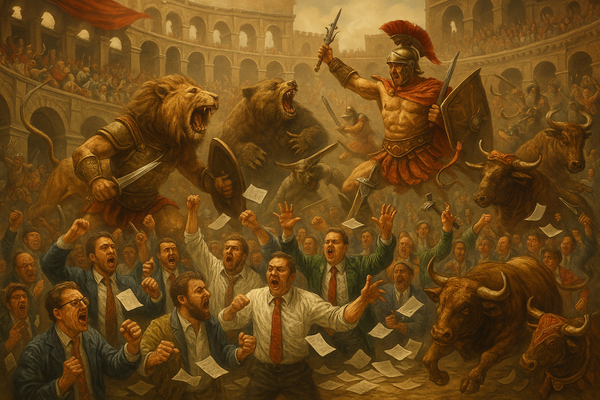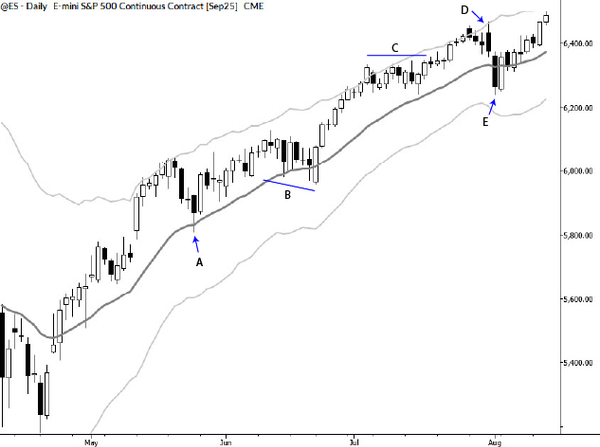The law of small numbers: a mistake you're probably making
One of the very positive advances over the past decade is the amount of attention focused on cognitive biases. We are, through the work of some gifted authors and speakers, becoming aware of how easily our brains misfire and cause us to make mistakes.

The list of cognitive biases is long, and many of those will hurt us in the market. Today, I want to write about one of the worst, and also one of the most-ignored. This might be the cognitive bias you’ve heard to least about, and it might be the one that hurts you most: the law of small numbers.
Law of large numbers
The law of large numbers is well-known, stats 101 territory: the proportion of results will tend toward an expected value as the number of trials increases. With large numbers, we can expect that proportion to be very close to the expected value of the process. (In plain English: if you flip a fair coin a bunch of times, you’ll see roughly as many heads as tails. If you take a deck of cards, pick a card at random, record the suit, return the card to the deck and choose another… over a large number of draws you’ll get about ¼ hearts (assuming no jokers.)
So that’s the law of large numbers, and it’s basically what makes much of the field of statistics (and, by extension, science) work.
Law of small numbers
The law of small numbers is a mistake in thinking. We might take a small sample and assume that what we observe there is true for the broad population.
This cognitive fallacy goes by other names such as “generalization from the particular”, or just “leaping to a conclusion”, and traders do it all the time. I’ve done it, and, chances are, you have too.
The key is to recognize it and to stop doing it!
In trading
The law of small numbers drives the gambler’s fallacy. (This blog actually started as a rant on that topic… I’ll come back to that later!) If we flip many heads in a row flipping that fair coin, we’re likely to think it must somehow “even out” because our little sample of a few flips must look like the expectation for that coin. We know that, over very many flips, we’re likely to get about 50% heads, so we think this should be true in smaller samples also.
But in trading, it’s not an abstract coin—it’s blood, sweat, tears, and money. We do a lot of work and then put ourselves on the line. If we’re not careful, we do that in every way: financially, mentally, emotionally, and even tie up our self-worth in the outcome of the market event. (This is one reason why it’s important to untangle the Gordian Knot and remove whatever we can from the trading equiation.)
The market event, the outcome of our trade, is liable to be an emotionally-charged learning event. Will we remember that we made the trade when a candlestick pattern broke a moving average? Will we remember we made a lot of money when we took “tips” from a guy named BigzMoneyNoWammiez in a Facebook group? Will we assume that someone’s short-term run of wins means they will keep winning in the market?
How about losses? What if we do exactly the right thing, and lose? What if we then do traditional trade review and come up with any number of factors that might have influenced our outcome? Might we think that we can’t have oatmeal for breakfast if we are going to trade well that day? (incorrect trade review is one way developing traders hurt themselves badly, and it’s always well-intentioned, focused work.)
What to do?
As with all cognitive biases, you can’t “fix” this—it’s a fundamental part of how humans think and process information. (And, from an evolutionary perspective, there was probably a benefit.) What you need to do is to be aware of it. Think about how this bias might impact your perception of data, and then work to counteract it.
Some suggestions for this:
- Cultivate the skill of thinking in large sample sizes. Don’t pay too much attention to the outcome of any one trade.
- Be aware of how emotional flags can (often, falsely) highlight certain events. For instance, if you’re thinking about your last 30 trades, you might find yourself focusing in on 2 or 3 that were quick losses wondering what you could have done better in those trades. Sometimes, this is justified, but often it is just noise in the data.
- Always ask “am I sure” and “what am I missing?” Become obsessive with your focus on these questions and honest with your answers. (Hint: the right answers to those questions are almost always “no” and “I might not know what I’m missing”!) Simply thinking around the corners like this will separate you from the mass of struggling traders who never dare face such hard questions.



